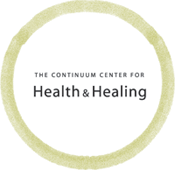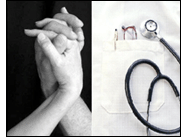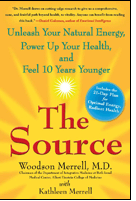 How do you stay healthy and find peace of mind, even joy, in the midst of these life-on-earth
challenges? Or if you're ailing, how can you get back to your old (new) self?
How do you stay healthy and find peace of mind, even joy, in the midst of these life-on-earth
challenges? Or if you're ailing, how can you get back to your old (new) self?
Newsflash: The health and well-being scene in New York is thriving.
Here's a sampling of 5 organizations making medicine that lights up the city (Beth Israel, NYU, St. Luke's,
Roosevelt, and Urban Zen):
At the Continuum (Beth Israel) Center for Health and Healing,
you don't have to be a hospital patient to start feeling better.
 The Center, which now has the official status of a Department, offers holistic consultations
with an integrative primary care doctor, and nearly every health-enhancing therapy you can
think of. One needs only to call and make an appointment. The doctor can be covered by
insurance, and offerings like stress reduction, acupuncture, massage, nutritional counseling
and supplements are fee-based.
The Center, which now has the official status of a Department, offers holistic consultations
with an integrative primary care doctor, and nearly every health-enhancing therapy you can
think of. One needs only to call and make an appointment. The doctor can be covered by
insurance, and offerings like stress reduction, acupuncture, massage, nutritional counseling
and supplements are fee-based.
Every month the Center serves over 3,000 people and their website gets half a million hits.
Dr. Woodson Merrell, a long-time leader in integrative medicine, is the Chairman of the
Department and the Founding Director. Dr. Roberta Lee, Integrative Internist, Botanical & Ethno-Medicine, is the Vice Chair.
She is also an
author and has studied with Dr. Andrew Weill. (245 5th Avenue at 28th Street)
If you need hospital care at Beth Israel (1st Avenue at 16th Street) you can get acupuncture at no cost before
and after surgery or in relation to a variety of in-patient situations, thanks to a new
Acupuncture Fellowship Program run by Dr. Arya Nielsen.
 At the
NYU Langone Medical Center, Cai McKeefe, RN, MS, coordinates the MindBody
Education & Patient Care Program. "We focus on wellness promotion and illness
prevention," says Nurse McKeefe. The program includes providing integrative therapies
and teaching relaxation techniques to patients, family members and staff — for free.
It helps more than 1,300 patients a year through bedside patient visits and Prepare
for Surgery workshops. (550 1st Avenue at 34th Street.)
At the
NYU Langone Medical Center, Cai McKeefe, RN, MS, coordinates the MindBody
Education & Patient Care Program. "We focus on wellness promotion and illness
prevention," says Nurse McKeefe. The program includes providing integrative therapies
and teaching relaxation techniques to patients, family members and staff — for free.
It helps more than 1,300 patients a year through bedside patient visits and Prepare
for Surgery workshops. (550 1st Avenue at 34th Street.)
Music therapy and pet therapy are enhancing the healing at both Roosevelt Hospital
and St. Luke's. Research has shown the positive effects of music on the body and brain,
and who can resist the unconditional love of a cuddly animal? Perhaps studies should be
conducted on the effects of experiencing music and pets simultaneously! I would bet on
an increase in positive outcomes. (Roosevelt, 59th and 10th; St. Luke's, 114th and Amsterdam.)
 If you or a loved one needs cancer treatment, try Beth Israel's Medical Oncology Inpatient
Unit (9 Dazian). It's been
turned into an Optimal Healing
Environment for hospitalized cancer patients thanks
to a grant from Donna Karen's
Urban Zen Foundation. This initiative, in conjunction with
conventional Western medicine, includes yoga therapy, holistic nurses, a research project,
soothing renovated space, and audio and video material. They even have a Patient
Navigator who helps steer the whole hospital situation clearly — a brilliant idea.
The nurses provide techniques such as relaxation breath work, guided imagery and
aromatherapy.
If you or a loved one needs cancer treatment, try Beth Israel's Medical Oncology Inpatient
Unit (9 Dazian). It's been
turned into an Optimal Healing
Environment for hospitalized cancer patients thanks
to a grant from Donna Karen's
Urban Zen Foundation. This initiative, in conjunction with
conventional Western medicine, includes yoga therapy, holistic nurses, a research project,
soothing renovated space, and audio and video material. They even have a Patient
Navigator who helps steer the whole hospital situation clearly — a brilliant idea.
The nurses provide techniques such as relaxation breath work, guided imagery and
aromatherapy.
Integrative (or holistic) medicine in New York is exciting, and patients have so much to be
grateful for in their recovery.
Still, it's a good idea to focus on your wellness right now so you don't find yourself
in a hospital for an extended stay.
 Just feeling kind of tired and not quite right? Can't find that vibrant energy you
remember as a kid? Beth Israel's Department of Integrative Medicine Chairman, Dr. Woodson Merrell, has written a book called THE SOURCE:
Unleash Your Natural Energy, Power up Your Health & Feel 10 Years Younger.
Just feeling kind of tired and not quite right? Can't find that vibrant energy you
remember as a kid? Beth Israel's Department of Integrative Medicine Chairman, Dr. Woodson Merrell, has written a book called THE SOURCE:
Unleash Your Natural Energy, Power up Your Health & Feel 10 Years Younger.
Invest in yourself — read good books. Explore what's best for you. Perhaps get a holistic
consultation, try a therapuetic massage, investigate vitamins, or boost your immune
system with acupuncture. Have fun discovering the many ways to feel fabulous in any season.
Urban Zen looks forward to developing more yoga
classes, meditation, nutrition, programs for children, and workshops. They have a
magnificent space on Greenwich Street with a loft and garden. In January, for
example, they presented an advanced program for integrative therapists. They've also hosted a Well-Being Forum as well as a luncheon for the Dahli Lama.
"I think a place where people can feel calm, where they can feel well, and they can
feel connected to each other is critically important," says Urban Zen Director, Joanne Heyman.
"The initiative and pilot study that we're doing at Beth Israel has to do with patients
who are already in the hospital by definition, but clearly one of the things that we're
very focused on is well-being," Ms. Heyman continues. "If you are
really in tune with
your body, if you're listening to it, if you are practicing some form of exercise, if
you are meditating to help with stress, if you are eating a well-designed diet —
that's all going to help you be well and stay well."
Meanwhile, back at the cancer unit, Dr. Benjamin Kligler, the Director of Research at the Health
and Healing Center, will be studying the effects of the Urban Zen "Intervention" at Beth Israel.
Will it mean a shorter length of stay at the hospital? Less medication? Money saved?
"It's science, so you go to it with a hypothesis and something you hope to see but
you don't actually know what you're going to see," says Dr. Kligler.
Dr. Merrell adds, "Once we show the outcome of this study, the goal is to then take
it to the National Cancer Institute, the National Institute of Health or similar organizations to
say, okay, let's do this as a large multi-center trial because we've shown X, and let's
see how we can do things to transform cancer care that could be replicable and cost
effective for institutions."
Dr. Louis Harrison, Clinical Director of the Continuum
Cancer Centers of New York,
believes that every hospital in the nation should have integrative medicine.
"What I would like to see happen is that this becomes supported through philanthropy
and through innovative ways as we develop a knowledge base and a research base,"
says Dr. Harrison.
"Ultimately I think the government, Medicare and Medicaid,
insurance companies, should recognize the value of this and should in fact pay
for a lot of these services because they improve a number of different outcomes
and they make the quality of care better."
"Integrative medicine makes sense on so many levels because
much of it has been shown to be safe," reflects Dr. Merrell. "Much of it has been around
for hundreds or thousands of years. Increasingly, it's been shown to be effective
in controlled settings.
"It's often much less expensive than conventional and it
empowers the patient with things they can do themselves rather than being a
passive recipient of various kinds of modalities of varying risks. I think that it is the future of medicine."
What's the future of your own personal medicine? Are you taking good care of yourself
these days? I'm assuming the answer is yes. Take a deep breath and smile.
Do something nice: Eat a nutritious meal, go for a walk outside, write a
gratitude list, anything positive. Maybe visit a friend in the hospital — an integrative medicine hospital.
